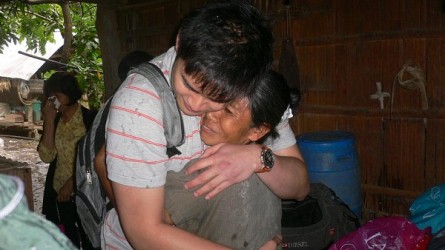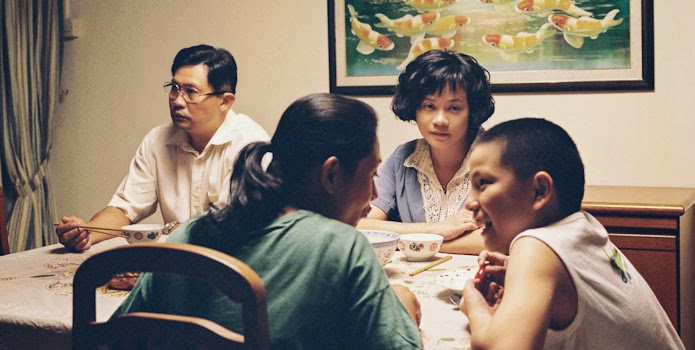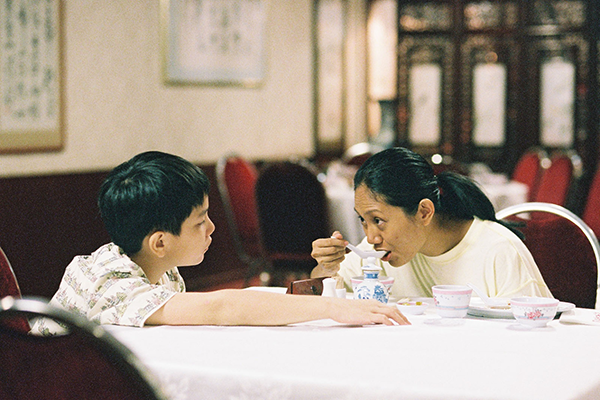
The film’s Chinese title, 爸妈不在家, translates to “Mom and Dad Are Not Home,” a reflection of the neglection of Asian children from their parents who have to work, and therefore placed in the care of foreign domestic helpers.
Director Anthony Chen says that the idea of maids in Singapore is “quite brutal. You invite a stranger into your home and have them form a relationship with your children over a number of years. Then when you decide you don’t need help anymore, you send them home, and that sense of family is very brutally erased.”
Instead of erasing his own nanny when he was a child, Chen made a film about her. When Ilo Ilo quietly hit Singapore’s shores in 2013, the island first hears of it through its Cannes Film Festival breakthrough, earning a twelve-minute standing ovation and receiving the legendary Camera d’Or award (for best debut feature). This is the first of its kind in Singapore. It also quickly picked up 25 other awards at film festivals around the world, including two prestigious Taipei Golden Horse awards for “Best New Director” and “Best Screenplay.”

Ilo Ilo is an accurate documentation of middle-class families in Singapore during the 1997 financial crisis that sent the nation into panic. When it first hit theatres, my friends and I who were in film studies rushed to the cinemas to view it as one entire cohort and Chen was hailed as our hero from then on. As someone who deeply appreciates Singapore culture, it was thrilling to see the black and white Zaobao, the channel 8 news opening title, traditional yellow and black taxis, old bulky desktop computers, and old school design of fast food paper cups. Singapore in the 90’s, was a much different and colourful landscape than it is now.

The film hit close to home for me. Jiale’s relationship with Terry was very similar to my nanny and I when I was about his age. Like Jiale, I would sneak out of my own room to hers and lie next to her, our age and differences set aside as we listened to Indonesian hit songs from her country. Terry is not a submissive, servile foreign helper that most maids are trained to become. Instead, she is feisty and independent. For example, when Jia Le saw a photo of Terry’s baby and asked how she could just leave her baby and go overseas to work, she replies “then why did your mother get a stranger to look after her son?” Instead of erasing foreign domestic helpers’ identities on television portrayals like Channel 8 and Channel U, Ilo Ilo helps create one for them.

Jiale’s character development is massive. At first, he bullies and defies Terry, but soon learns his lesson when he takes multiple scoldings from her. Eventually, the two form a special bond amidst the adversities the family faces. In one particularly endearing scene, Jia Le takes note of Terry’s exclusion from a family banquet and offers her his shark’s fin soup.

Hwee Leng might be described as a tiger mother, but that is the norm for Singaporean mothers. A hard character to like, she imperiously bosses around both her husband and Teresa. She talks down to Teresa and never expresses even a hint of gratitude. She may behave monstrously, but sadly, she is a representation of most Singaporean mothers who hire foreign helpers as their servants. Many of us have seen her type of behaviour towards domestic helpers before, be it through relatives, friends or our own mothers.
Teck is a symbolism of how the enormous pressure of work and economic woes can affect the normal Singaporean. He defies Hwee Leng by smoking cigarettes in the hallway outside their apartment, which lead to his own son trying out cigarettes in the toilet. When allowed one drink at a family birthday party, he collapses in a bathroom drunk. He is a mirror of the anxieties of the Singapore society, a representation of how one slip at the economic ladder can cost you everything – literally.

In conclusion, Ilo Ilo is a movie that doesn’t waste a word or an image. Chen’s refusal to linger on the economic realities that bring enormous anxiety and uncertainty in his characters can be seen as the indifference the Singapore government had on its nation during the 1997 financial crisis. The film also serves as a semi-documentary, capturing an acute depiction of how Jiale’s family reflects Singapore’s complex and tightly knit society.

Perhaps through each character, Anthony Chen was hoping to enlighten his audience on a different element of Singaporean society. I personally felt as if the setting of Ilo Ilo – the HDB apartment in which the family lived – gave an illusion of a restricted, cramped space which not only was physically restrictive, but also emotionally restrictive. The mise-en-scene of Teresa having to leave the house to make a phone call, or being glared at by Hwee Leng as she attempted to make the sign of the cross at the dinner table emphasized this fact. By trying not to step on each other’s toes, each person was losing a part of their personality. While the film doesn’t overtly emphasize this fact, I personally felt as if Hwee Leng was the biggest consequence, the individual who had had to lose the most of themselves in this lifestyle – only once, when buying self-help material, is she shown doing something for herself, as a hobby.
LikeLike
I thoroughly enjoyed your breakdown of each character, and how their circumstances revealed the essence of human spirit, as well as life in Singapore during that period of time. Cinematically, this film touched my heart in how it made me relate to many elements of the film. I feel that Anthony Chen was particular in including intricate details of the Singaporean life – which was a good idea as it kept me engaged to the story. The fact that this film is so relatable creates a space of empathy for the audiences, which I feel is an important emotion to have when watching a film. Whether it be Terry, Jiale or even the parental figures, I could easily empathise with what they were going through, and I could understand that each word spoken meant something to them and the narrative as whole. Your analysis was personable, passionate and detailed! Great job!
LikeLike
The character of Hwee leng really stood out as the most realistic portrayal of Singaporean mothers ever. Her fierce demeanor yet while tender at times. Juggling work, a pregnancy and a defiant son can really take its toll on people but Hwee leng manages to get by, I truly felt for her character as she tried to keep her family from falling apart in so many ways but alas life is not kind. Still not to take any credit away from Terry and Jia Le, their bond seemed so real and so life-like I couldn’t help but shed a few tears when she departed. Once again a phenomenal review, a true wordsmith indeed.
LikeLike